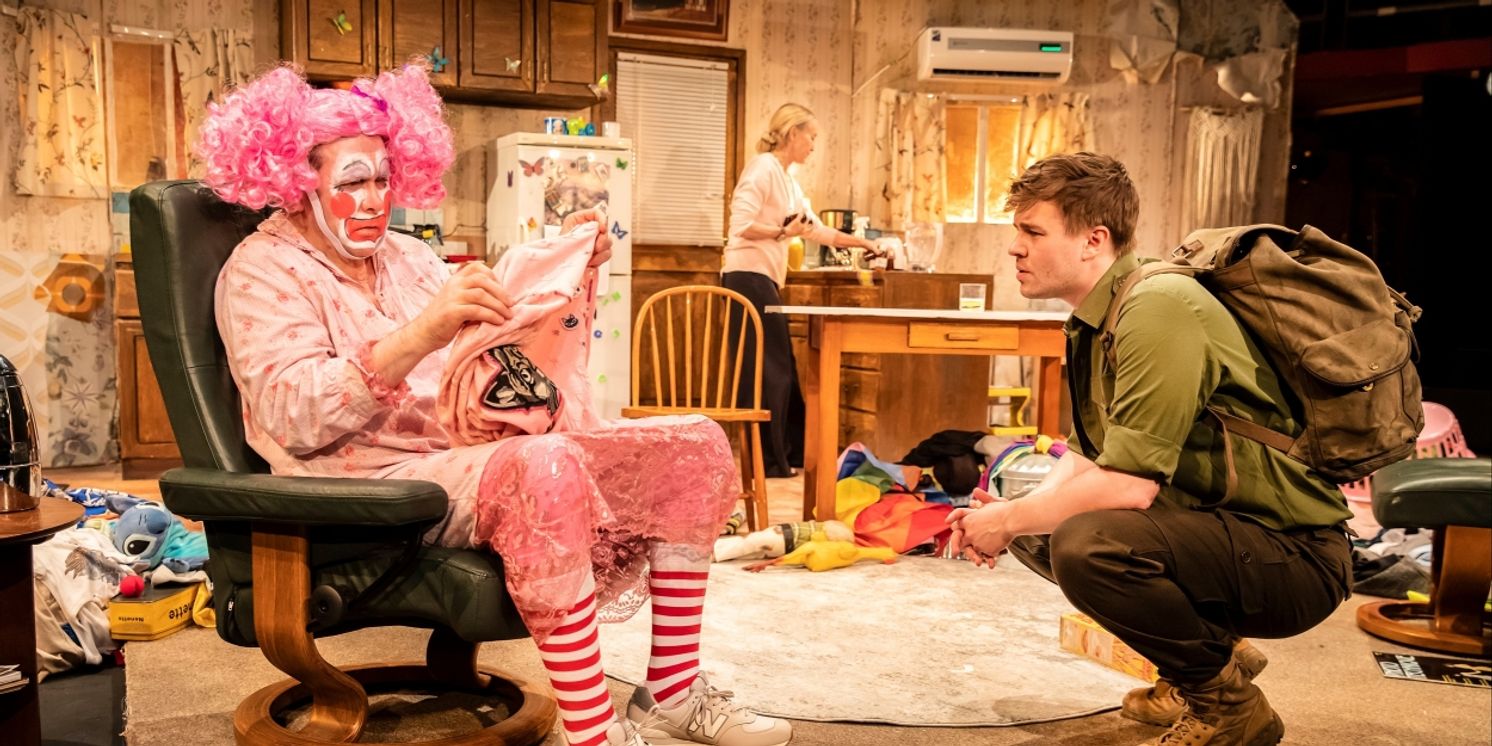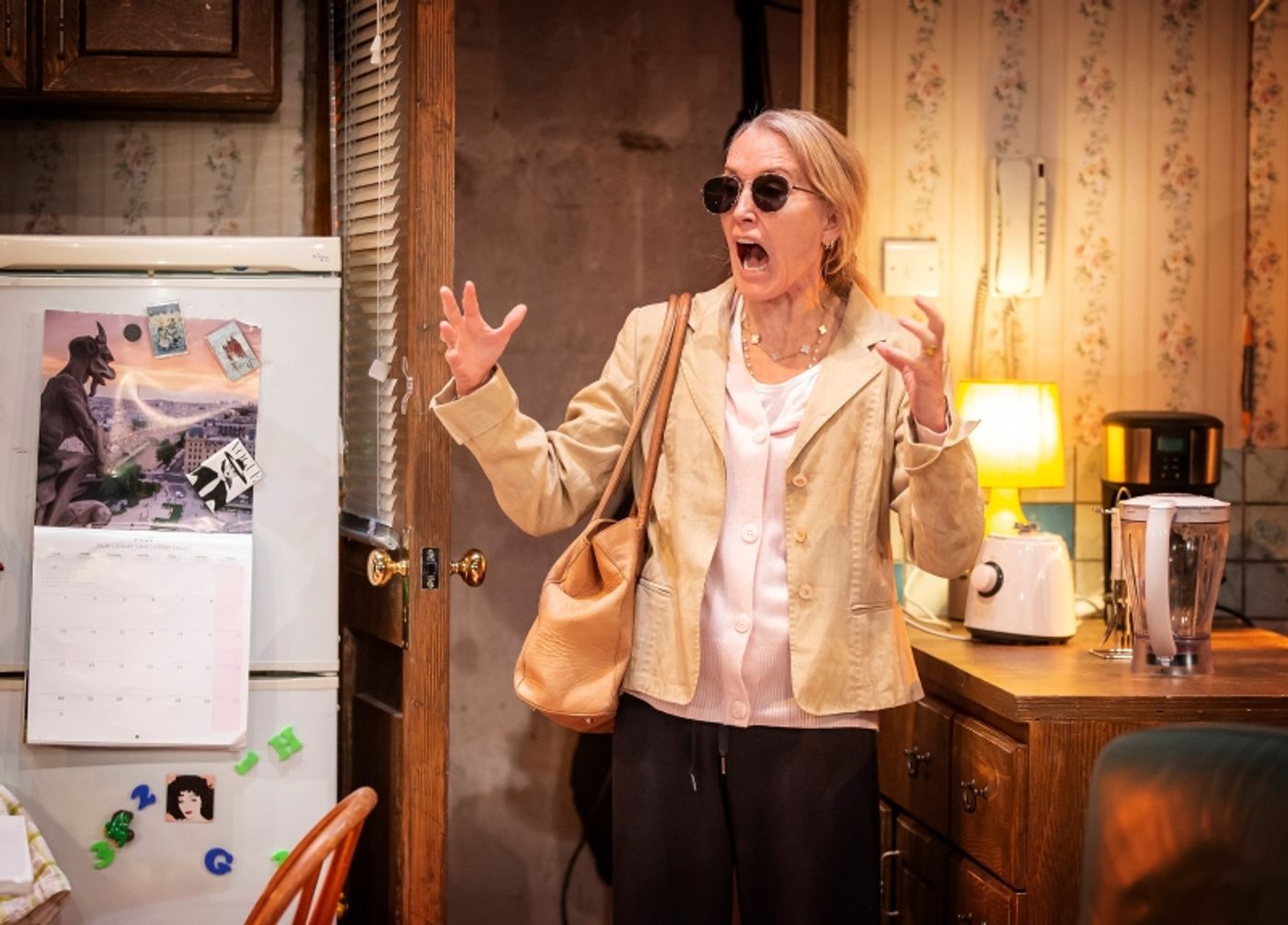Review: HIR, Park Theatre
Taylor Mac queers the kitchen sink drama

![]() When I arrived at Park Theatre on a rainy Wednesday night, I can’t say I was expecting to see Felicity Huffman yelling “We’re all transgender fish!”. Throughout its two-hour run-time, Hir is exactly this unexpected. Tackling gender identity, trauma, patriarchy, violence, and more, Taylor Mac’s upside-down take on the kitchen sink drama is a knotty, complicated play that’s tricky to make up your mind about.
When I arrived at Park Theatre on a rainy Wednesday night, I can’t say I was expecting to see Felicity Huffman yelling “We’re all transgender fish!”. Throughout its two-hour run-time, Hir is exactly this unexpected. Tackling gender identity, trauma, patriarchy, violence, and more, Taylor Mac’s upside-down take on the kitchen sink drama is a knotty, complicated play that’s tricky to make up your mind about.
The basic premise of Hir is reminiscent of many well-loved classic plays, most notably Arthur Miller’s All My Sons. In this version, however, Isaac, the son (Steffan Cennydd) returns from war and finds his old home in a state of chaos – both physically, but also in terms of his family dynamics. His formerly cruel and abusive father Arnold (Simon Startin), having suffered a stroke, is now treated like a toddler or a pet, dressed up in a pink nightgown and clown makeup and ordered around.
The head of the household is now mother Paige (Huffman), but her worldview has been completely revolutionised by her child Max (Thalia Dudek), who is transmasculine and uses ze/hir pronouns. Military vet Isaac tries to restore order to his now messy home, but the family’s different ways of life lead to an inevitable crisis.
In its basic premise and form, Hir is a very traditional piece of theatre. It follows a typical two-act structure and the whole play takes place in one room with the same four characters. Within this familiar form, however, Mac wreaks havoc on the notion of the nuclear family, exploring what takes place in a family unit without a patriarch. The characters are all larger than life, edging towards broadly sketched stereotypes – Dudek’s Max especially feels like the embodiment of radical young queer anarchy, the right wing’s ultimate nightmare, insisting that ze is educating hir mother and not the other way round.
But while Hir initially seems to be a play about the ‘trans debate’, it concerns itself more with its homophone ‘here’, and the idea of home. The family’s California home has been built on a landfill, a ‘starter home’ that has outlasted its life expectancy. While Paige wants to run away, confident that Max will lead them to a new future, Isaac insists that they need to put in the work to repair the place they grew up and stay loyal to their neighbourhood. The play asks what, if anything, we owe to places and people that we consider harmful or outdated, drawing parallels between the house and the abusive father.
This is a play thick with ideas; they are heaped together like the clothes scattered all over the stage. While we tend to think of theatre as having some kind of message or takeaway, Hir instead presents us with a vast web of ideologies, ethical debates, and hypothetical scenarios and asks us to go away and think about them. However, it takes this a little too far: the complexity of the topics explored makes the play feel murky and lacking in direction, leaving audiences walking away feeling more confused than inspired or moved.
Mac is a writer with quite a collection of awards, including a Pulitzer nomination and a MacArthur Genius Grant, among a whole host of others. There’s something about Mac’s writing however, that feels like it belongs to a specific genre of cult American theatre which doesn’t quite land in the UK. It certainly feels foreign to the current London theatre landscape.
Despite the muddled tone, the cast each give compelling performances of tricky, morally grey characters. Huffman, recently more famous for her college admissions scandal than her acting, really proves herself as the slightly unhinged mother, full of energy but with a cruel streak that starts to come through. Startin has a lot less to work with, in a performance reliant on movement and facial expressions, but paints a believable portrait of a man fading away into nothingness. Cennydd is every inch the returning military son, charming but with a chilling masculine edge and a strong grasp of the genre and character. The unexpected standout performance, for me, comes from Dudek, who gives humanity to a larger than life character, adding moments of subtlety and a compelling depiction of a person caught between different gendered experiences.

Image Credit: Pamela Reith
Described by Mac in the programme as ‘absurd realism’, the world of the play is fairly naturalistic. Ceci Calf’s set is intricately detailed, from a working blender and sink to a functioning air-con unit. The only time this falls away is at the end of the first act, when the realism fades away in favour of a more abstract exploration of Isaac’s PTSD. The set reveal this entails is a real standout moment of the piece, both visually impressive and enriching to the show’s meaning, but the action onstage around it descends somewhat into a kind of melodrama that feels out of place.
The more creative touches added by director Steven Kunis all tend to be clever ideas that don’t entirely work within this show; however, he clearly has a brilliant grasp of dialogue, character, and comedic timing, with the blocking too imbued with meaning and creativity. Some of the line deliveries, primarily those from Huffman and Dudek, are laugh-out-loud funny, and the distinctive style of humour developed by Mac and Kunis is one of the show’s strong suits.
This is the kind of play that would feel almost spiteful had it not been written by a self-described ‘radical queer’ – it feels uncomfortably topical with the current debate around trans rights in the UK. That being said, Hir doesn’t really act as any kind of defence of trans people; while queerness is in a way the show’s norm, Mac also pokes fun at it.
Upon leaving the theatre, a friend asked me what I thought of the show, and whether it was worth her seeing; put on the spot, I really didn’t know how to answer. It’s definitely an interesting watch, especially if you have an interest in gender politics. I think what I ended up saying was that it’s ‘definitely a lot’.
Hir runs at Park Theatre until 16 March
Image Credit: Pamela Reith
Reader Reviews
Videos

